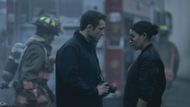Freddy from Smoke seems like an invisible guy at first, but Episode 5 exhibits a turning point in how anger cultivates within him. For the first few episodes, he works as a fry cook and stays quiet, almost hidden.
When he doesn’t get a promotion, we see the little signs of frustration rising. By the end of Episode 5, we watch in horror as his bottled-up feelings explode and he starts a deadly fire that kills a couple in their home. That moment shows how Smoke brews horror slowly and quietly.
There is no huge scream or loud shock; it’s the calm before the storm. Freddy’s actions are chilling because they feel rooted in deep loneliness and rage. Smoke doesn’t rely on ghosts or monsters; it utilizes real human feelings.
When Freddy snaps, it becomes clear: the show is teaching us that quiet people can be the most dangerous. That is where the real horror in Smoke comes from.
Freddy stays quiet until his anger transforms into fire

In early episodes of Smoke, Freddy is a gentle, introverted fry cook. He doesn’t speak much and tries to stay out of sight. People don’t notice him. This quiet presence makes us feel safe, and that safety makes his later actions even more shocking.
In Episode 5, Freddy finds out he lost a chance to become a manager. That small disappointment, along with seeing how others treat him, pushes him closer to breaking. The show lets us sit in silence with Freddy, watching small details of his life.
He sighs when he’s told to wear a hat. He walks away from work feeling small. These moments add up. When he fills milk jugs with gasoline and sets a house on fire, the horror feels earned because we witnessed every unravelling step.
Smoke is patient. It builds Freddy’s anger slowly, and that makes his final act of violence hit harder.
Freddy’s fire changes the investigation

Freddy’s arson in Episode 5 isn’t just a random crime; it completely shifts the whole story. Up to now, the investigators have focused on Dave and other suspects. But when Freddy burns a house, he doesn’t even live nearby; the detectives realize this is personal and deliberate. This new fire is bigger than before and affects richer people, which makes it worse in their eyes.
The detectives scramble to figure out who did it and why. Michelle starts talking to Dave’s old partner for clues. But while they’re chasing Dave, Freddy’s crime is already spreading fear.
The investigators feel the heat of this new horror, even though they haven’t spotted the real cause yet. It shows how quickly a quiet person can turn chaos into fire.
We understand Freddy better through physical change

The actor Ntare Guma Mbaho Mwine changed a lot to become Freddy. He lost around 40 pounds during the shooting. He also changed his posture and voice to look weak, invisible, and tired. This physical transformation helps us feel Freddy’s loneliness and anger deeply.
Since he looks frail and quiet, when he acts out, it shocks us. It shows how someone who seems harmless can be hiding a lot of pain. Smoke uses this to remind us that danger can come in quiet forms and that we can misunderstand people by how they look.
Smoke uses quiet horror to surprise the audience

Smoke doesn’t try to scare us with loud scares. It lets tension build using silence, small gestures, and narrow shots. The camera often shows Freddy in small spaces like a kitchen or hallway to make us feel closed in, claustrophobic. We feel his anger growing even before we know it ourselves.
That style makes the scene when the house burns down feel even more intense. We already know Freddy, so we feel the horror up close rather than through shock. This quiet approach feels new and realistic. Pain and anger don’t always scream; it sometimes grows in silence, and that’s exactly what Smoke demonstrates.
Freddy’s path exhibits emotional danger in ordinary life

Episode 5 shows how anger and hurt can turn into something terrible if left alone. Freddy didn’t wake up planning evil; his bottled-up disappointment and frustration were pushed too far. That’s what Smoke is really saying: danger isn’t always obvious.
Emotional pain in everyday life can lead to disasters in quiet ways. Because the show takes time to let us know Freddy, we feel hurt and fear when he finally crosses the line. We realize the horror came from a sad place, not evil for its own sake. Smoke teaches that quiet people can be storms waiting to break, and that makes his evolution a real masterclass in quiet horror.
